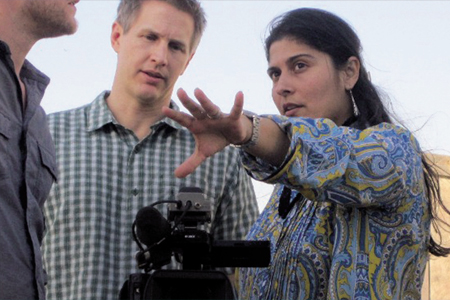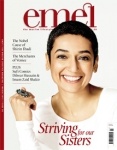
Directing Reality
Issue 90 March 2012
Oscar-winner, Sharmeen Obaid-Chinoy, is the first Pakistani to win the prestigious award. Here, she speaks to Ali Khimji about her films, her career, and the future of the Pakistani film industry.
“I was in my office with my crew and husband, and we were huddled around my computer when the nominations were announced,” says Sharmeen Obaid-Chinoy. “When we saw Saving Face on the Academy website, we erupted in screams and shouts of joy and celebrated together, after which I called up Daniel Junge, my co-director, to tell him the good news.” This was the moment when Sharmeen first found out that she had been nominated for an Oscar for her short documentary Saving Face.
Being nominated for an Oscar is an achievement within itself, but Sharmeen has the additional accolade of being the first Pakistani to be recognised by the Academy, something which she says “is the stuff that dreams are made of.” Her documentary follows a British-Pakistani plastic surgeon, Dr Mohammad Jawad, as he travels around Pakistan treating victims of acid violence. Official figures state that there are a hundred cases of acid attacks in Pakistan each year, but there are many more that go unreported in remote areas of the country. The idea for the documentary came from Sharmeen’s co-director, Daniel Junge, and as soon as he had suggested it, she knew that she had to be on board straightaway. “Acid violence is a particularly devastating manifestation of gender bias in Pakistan,” she says. “We need to introduce the issue into public discourse so that we can work as a community to eradicate it.”
Making a film about a social problem such as this does not go without hindrance, as Sharmeen found. Acid violence predominantly occurs in the Seraiki belt in the Punjab region, where a lot of cotton is grown and acid can be acquired with ease as it is used out in the fields, so it made sense to set the film there. The area has some of the lowest levels of education and highest instances of poverty in the country, so the crew had difficulty connecting with local communities and reaching out to many of the survivors. But with time, they were able to establish contact and the process gained momentum.
Sharmeen started work in the field of print journalism at the age of 14. She was pursuing her undergraduate degree at Smith College in America when the tragic events of 9/11 happened, and this completely changed her focus. “I quickly realised that there was a need for local journalists from the Central Asian region, as they had a comprehensive grasp of the cultural and political context,” she says. She was also enticed by the medium of film, because “it provided a more visceral account of the realities on the ground and would allow for more audience engagement.” Since her first day working on a film set, she hasn’t looked back.
Her films have centred on topics relevant to the Muslim world. Like many other filmmakers, her inspiration varies from project to project. It can be something as small as a short conversation with an acquaintance, or it could be an article that she has recently read in the paper. The ideas can come to her within minutes, or she and her team may devote several hours to source a new angle on a story that hasn’t been told yet. But Sharmeen acknowledges that her background has a major influence on the films she does: “Naturally, I am drawn to stories about children, women and other marginalised communities, as well as issues around education and how communities deal with conflict.”
And given that the Pakistani film and documentary industry is still in its early stages relative to other countries, as well as the general film industry being male-dominated, it would be safe to assume that Sharmeen may face challenges because of her gender. However, she is certain that this has never hindered her, and “has been an asset at times,” because it allows her access to women in communities that follow strict gender segregation.
In 2010, Sharmeen won an Emmy Award for her documentary Pakistan: Children of the Taliban. In it, she investigated how the war on terror was creating a generation of radicalised children in her homeland. Sharmeen knows the benefit of exploring communities on the grassroots level, so she visited many villages and refugee camps on her travels around the country. Her poignant ability to capture human stories is best illustrated in one instance when she meets two teenage boys who are best friends. Their madrassah was hit by the Pakistani army and American missiles. One of the boys wants to join the Taliban in retaliation of the attack in which his cousin died, whereas the other blames Al-Qaeda and wants to join the Pakistani army to rid the country of its influence.
Sharmeen’s success on the international stage should give young Pakistani filmmakers hope for the future. With the burgeoning Bollywood scene only next door to the country, she realises that it’s been hard for Pakistan to develop its own identity in the television and film industry. But Sharmeen is also quick to point out that filmmaking is one vocation which you don’t have to have studied beforehand, because much of the training happens on set, as she experienced herself. “I taught a filmmaking course at a college in Karachi last year, and it was inspiring to see so many young women going the extra mile to get their story and being as hands on as their male counterparts,” she says. “To be successful in film, you need to be committed to a career of hard work, dedication and perseverance; something that all Pakistani women have within them.” However, what she doesn’t mention is that Pakistani women are incredibly fortunate to have a prime example for them to follow in Sharmeen.
Bookmark this |
|
Add to DIGG |
|
Add to del.icio.us |
|
Stumble this |
|
Share on Facebook |
|
Share this |
|
Send to a Friend |
|
Link to this |
|
Printer Friendly |
|
Print in plain text |
|


Comments
0 Comments